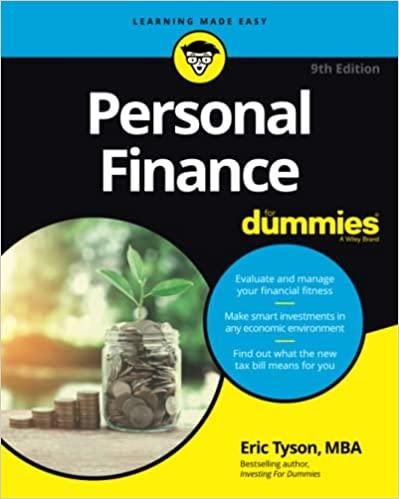Question
Did You Know? According to the National Endowment for Financial Education, 70 percent of major lottery winners end up with financial difficulties. These winners often
Did You Know?
According to the National Endowment for Financial Education, 70 percent of major lottery winners end up with financial difficulties. These winners often squander the funds awarded them, while others overspend. Many end up declaring bankruptcy. Having more money does not automatically mean you will make better financial choices.
CONSEQUENCES OF CHOICES Every decision has consequences. For example, a decision to invest in stock may mean you cannot take a vacation. A decision to go to school full time may mean you cannot work full time. Opportunity cost is what you give up by making a choice. This cost, commonly referred to as the trade-off of a decision, cannot always be measured in dollars. It may refer to the money you forgo by attending school rather than working, but it may also refer to the time you spend shopping around to compare brands for a major purchase. In either case, the resources you give up (money or time) have a value that is lost.
Decision-making will be an ongoing part of your personal and financial situation. Thus, you will need to consider the lost opportunities that will result from your decisions. Since decisions vary based on each persons situation and values, opportunity costs will differ for each person.
DQ Week 11
Within the next six months, Kent Mullins will complete his undergraduate studies with a major in international studies. He has worked part-time in various sales jobs. He has a small savings fund ($1,700) and over $8,500 in student loans. What additional information should Kent have available when planning his personal finances?
How about you? Depending on your current (or future) life situation, what actions might you take to determine your current financial situation?
1. When making major financial decisions, I research them using a variety of information sources.
Yes/No/Uncertain
2. My specific financial goals for the next year are written down.
Yes/No/Uncertain
3. My family and household situation is likely to stay fairly stable over the next year or two.
Yes/No/Uncertain
4. Time value of money calculations often guides my saving and spending decisions.
Yes/No/Uncertain
5. I am able to name specific types of risks that can affect my personal financial decisions.
Yes/No/Uncertain
000
Step by Step Solution
There are 3 Steps involved in it
Step: 1

Get Instant Access to Expert-Tailored Solutions
See step-by-step solutions with expert insights and AI powered tools for academic success
Step: 2

Step: 3

Ace Your Homework with AI
Get the answers you need in no time with our AI-driven, step-by-step assistance
Get Started


